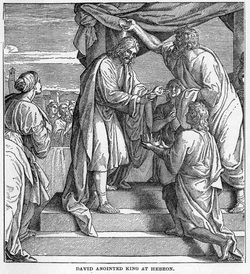
The next step in David’s ascension occurs here in 2 Samuel 2. Mourning of Saul has ended. Time to move on, literally. As usual, David inquires of the Lord as to what next steps to take. He is told to go to Hebron in Judah, one of the towns to which David gave the spoils of his Amalekite victory (1 Sam. 30:26). Hebron was where Abraham bought land to bury Sarah and where Abraham, Isaac, Rebekah, Jacob, and Leah were buried. It is deeply and historically significant land. Hebron’s other roots are with the patriarch, Caleb, which is significant because David’s wives are specifically mentioned here: Abigail was the wife of Nabal, a prominent Calebite landholder (and as was made clear in 1 Sam. 25, Abigail was likely far more respected than Nabal), and Ahinoam who was also from a clan in the Calebite area. David is therefore already related by marriage to these two important clans in the area and as such he may have also had important claims on land in the area.
Verse 3 indicates that he may have had as many as 2,000 people with him.
Verse 4 states that “the men of Judah” “anoint” David as king of the Judahite region, which includes Hebron. We recall that David had been previously anointed by Samuel thus conferring upon David a sacred calling of God (1 Sam. 16:13). Here, it is the people who authorize his rule thus legitimizing David by both God and the people – the broadest possible basis for his leadership.
As we often find in 1 & 2 Samuel, there is contrast here in chapter two. David inquires of God for his next steps and is legitimated by God and the people. Abner takes it upon himself to raise up Ish-Bosheth as the new king of Israel – more Saul-like self-centeredness. Ish’s rule is brief and unsuccessful. In contrast, David’s rule will be long and gracious. His first act as ruler of Judah is to issue kind words and promises to Jabesh-Gilead for taking care of Saul’s body. By being respectful of Saul to the end (and beyond), David is really being respectful of God’s anointing of Saul. Jabesh-Gilead is in the northern region of Israel (Judah is in the southern region), so David expresses gratitude and friendship to an area of Saul’s influence, the beginning of reunification (or perhaps more accurately Israel’s first true unification as a nation) under David.
For application:
Leadership that is appropriate to God’s kingdom is always shared leadership that is accountable to God and to the people. This is true for Ancient Israel’s success, for the founding of our nation (our Founders looked to lessons learned in Ancient Rome, England, AND lessons learned in the Bible), and it is true of our Presbyterian tradition. What are your thoughts or questions about leadership as it relates to David and the Biblical lesson?
Some critics suggest that with 2,000 people David did not just go to Hebron, but rather his actions were more like a coup. The elders of Judah, by this logic, would have had no choice but to make him king. Is this a legitimate read of this text? Why or why not?
Verse 3 indicates that he may have had as many as 2,000 people with him.
Verse 4 states that “the men of Judah” “anoint” David as king of the Judahite region, which includes Hebron. We recall that David had been previously anointed by Samuel thus conferring upon David a sacred calling of God (1 Sam. 16:13). Here, it is the people who authorize his rule thus legitimizing David by both God and the people – the broadest possible basis for his leadership.
As we often find in 1 & 2 Samuel, there is contrast here in chapter two. David inquires of God for his next steps and is legitimated by God and the people. Abner takes it upon himself to raise up Ish-Bosheth as the new king of Israel – more Saul-like self-centeredness. Ish’s rule is brief and unsuccessful. In contrast, David’s rule will be long and gracious. His first act as ruler of Judah is to issue kind words and promises to Jabesh-Gilead for taking care of Saul’s body. By being respectful of Saul to the end (and beyond), David is really being respectful of God’s anointing of Saul. Jabesh-Gilead is in the northern region of Israel (Judah is in the southern region), so David expresses gratitude and friendship to an area of Saul’s influence, the beginning of reunification (or perhaps more accurately Israel’s first true unification as a nation) under David.
For application:
Leadership that is appropriate to God’s kingdom is always shared leadership that is accountable to God and to the people. This is true for Ancient Israel’s success, for the founding of our nation (our Founders looked to lessons learned in Ancient Rome, England, AND lessons learned in the Bible), and it is true of our Presbyterian tradition. What are your thoughts or questions about leadership as it relates to David and the Biblical lesson?
Some critics suggest that with 2,000 people David did not just go to Hebron, but rather his actions were more like a coup. The elders of Judah, by this logic, would have had no choice but to make him king. Is this a legitimate read of this text? Why or why not?

 RSS Feed
RSS Feed